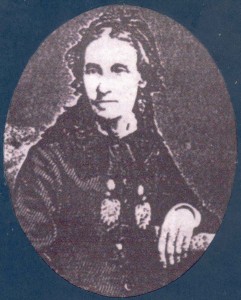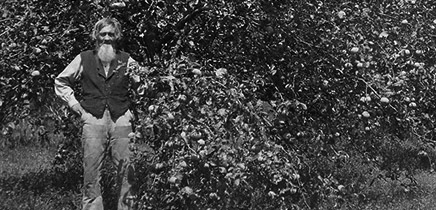The story of Clara Judd is a story of controversy. Arrested as a female spy for General John H. Morgan, Judd spent time locked up in the military prison at Alton, Illinois. Was Judd truly a Confederate spy, or was hers a case of misplaced trust and innocence, as she spent her remaining life claiming?
Burritt and Clara Judd were early settlers to Chanhassen. Burritt Judd was an architect and builder, completing three churches in Minneapolis which gained him national acclaim. The couple also served as missionaries for the local Episcopal Church, with Burritt being only the second person to be ordained in Minnesota. After only a short time settled in Carver County, the couple moved south in 1858. Clara Judd was suffering from poor health, and it was thought the climate in the South would do her good. Burritt accepted a job at the University of the South, Sewanee, Tennessee and helped to construct some of the first campus structures. Before migrating south, they left their mark – Lake Lucy in Chanhassen was named for the Judd’s daughter.
In 1861, while on business in Nashville, Burritt Judd and one of the Judd children were killed in a train accident. Clara Judd was left a widow with seven children and no way to support herself in a country at war. In 1862, she returned to Chanhassen to mortgage the family farm and leave her three youngest children with family. In the end, they were left with a sister in St. Louis, Missouri. Work was found for her older sons in a government factory in Atlanta to provide money for the family. From then on, Clara traveled often between the lines of North and South visiting her children in different parts of the county. This is where her trouble started.
These frequent trips across the lines became suspicious to those in power. It was thought the frequent trips were a way to smuggle goods and supplies over the lines, count troop numbers and deployments, and provide vital details to General Morgan, who she supposedly worked for. On one such trip, she was detained in Murfreesboro, Tennessee for a number of days waiting for a pass. While there, she met a man claiming to be a paroled prisoner, offering her a ride in his buggy into Nashville. He was actually a Northern counterespionage agent named Delos Thurman Blythe. Blythe reported her to authorities, claiming her behavior as suspicious. He claimed to overhear a Confederate whisper to her, “If they won’t let you in, you can go across country, about four miles to my father’s, and they will run you through the lines anyhow.” He reported to his boss and was instructed to assist her on her journey to trap her.
From Nashville, the duo boarded a train for Louisville, Kentucky, traveling together for a number of days. Clara fell in love with Blythe, and after a brief illness, made plans to travel on to Mitchellville, Tennessee. There, both were arrested by army police, with Blythe being roughed up. Witnesses claimed Judd was more worried for her love, Blythe, than herself. Among her possessions was a bible inscribed to Blythe, meant to be a gift. Using her love against her, Judd was told that Blythe would be court-martialed, and she testified on his behalf, saying he was innocent and she alone was responsible. Unknown to her, Blythe had already been released. She never saw him again.
Clara Judd was imprisoned at Alton, Illinois for eight months on the charge of espionage. She was paroled due to poor health and ordered to return to Minnesota and stay there. Upon her return, Judd was criticized in the press, who had decided her guilty. Despite living quietly under an assumed name, Judd faced criticism and ostracism to the end of her days. Upon her release, she issued a statement claiming innocence, that she was tricked by Blythe. Her claim was that “he has sworn falsely and misrepresented other things then said jocosely.”
The truth of her tale may never be known. Newspapers at the time, and the local Chanhassen history book, claim her guilt. A recent book, Stealing Secrets, discusses her claims of innocence and being tricked by love. Was her frequent travel simply to visit her children, or was she truly a spy? Was she duped into trusting Blythe and taking the blame, or did he really observe suspicious behavior? We may never know. History always has two sides, and presented here are the facts. Clara Judd is remembered in history as a female Confederate spy, trapped and imprisoned in an undercover operation.

BIBLIOGRAPHY
“Gen. John H. Morgan’s Female Spy, alias Mrs. Clara Judd, of Carver County, Minnesota: Interesting Details of her Detection.” Chaska Valley Herald, December 5, 1863.
Hoisington, Daniel John. Chanhassen: A Centennial History. Chanhassen, MN: The Press, Banta Corporation, July 1996.
“Local Items: Distinguished Arrival.” Chaska Valley Herald, August 29, 1863.
Winkler, H. Donald. “Trapped in a Sting Operation: Clara Judd”. In Stealing Secrets: How a Few Daring Women Deceived Generals, Impacted Battles, and Altered the Course of the Civil War, edited by H. Donald Winkler, 247-251. Naperville, Illinois: Cumberland House, 2010.


